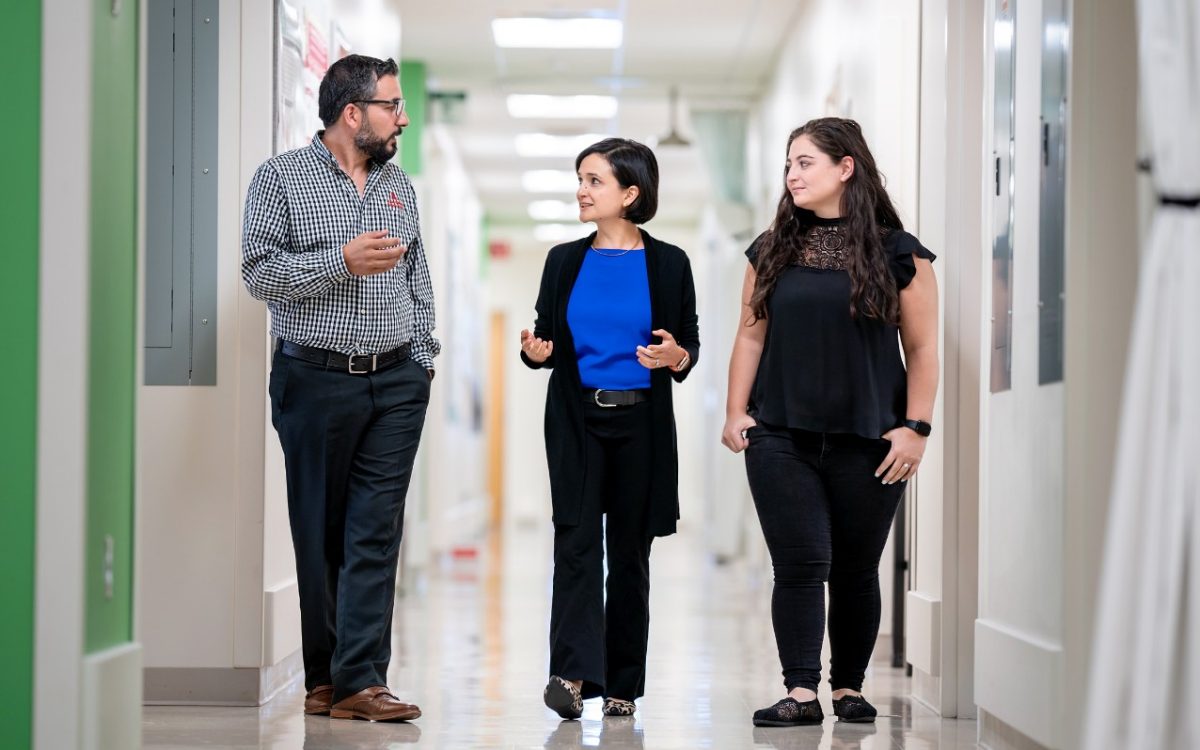
Abdullah Freiwan, Ph.D., Paulina Velasquez, M.D. and Jaquelyn Zoine, Ph.D. of the St. Jude Department of Bone Marrow Transplantation and Cellular Therapy.
Scientists at St. Jude Children's Research Hospital are improving chimeric antigen receptor (CAR) T-cell therapy. Their new simplified approach selected for an advantageous T-cell type and showed promise in the lab against relapsed T-cell acute lymphoblastic leukemia (T-ALL). The study was published online this week in Blood.
Acute lymphoblastic leukemia (ALL) is the most common form of childhood cancer and advances in treatment have improved outcomes. At St. Jude, the five-year ALL survival rate is 94%. However, patients with T-ALL who relapse have a poor prognosis, with a five-year survival rate of less than 10%.
"Current treatments for T-ALL can still be very toxic," says corresponding author Paulina Velasquez, M.D., St. Jude Department of Bone Marrow Transplantation and Cellular Therapy. "And if T-ALL relapses, it becomes challenging to treat. That's why we're interested in exploring cell therapies, like CAR T cells."
CAR T cells for T-ALL are a promising approach
CAR T-cell therapy is a type of immunotherapy that modifies human immune cells to kill cancer cells. CAR T cells target a particular protein on cancer cells, called an antigen.
"Think of antigens like a colorful flag that cells display," said co-first author and postdoctoral researcher, Jaquelyn Zoine, Ph.D. "CAR T cells can be compared to ninjas hired to find and destroy the enemy (cells) with a certain color flag (antigen)."
Several CAR T-cell therapies for relapsed T-ALL target the antigen CD7. This antigen is present on many T-ALL cancer cells, as if the cells were waving the same flag. However, there is a problem.
"Most normal T cells also express CD7 and because these CAR T cell warriors follow orders exactly," said Abdullah Freiwan, co-first author and lead researcher. "They will kill any cell with that particular flag, even if that means killing each other."
Other groups of scientists have tried solving this problem by genetically modifying or otherwise altering CAR T cells to remove CD7 expression. However, these modifications are complex and have associated risks.
Making the most of a small T cell group
The St. Jude scientists focused on a small group of T cells that naturally do not express CD7 (T cells without a flag). They generated a method to select and expand these cells, and then made them into CAR T cells.
The naturally 'flag-free' cells performed very well in laboratory studies, effectively clearing the tumor. The cells also provided long-term protection in a cancer recurrence experiment (rechallenge) in a mouse model.
CAR T cells without CD7 are present in clinical trial samples
Based on their preclinical results, the St. Jude group wanted to know if there were CAR T cells without a flag (CD7 negative) present in the blood of patients receiving CAR T cell therapy. They analyzed data from an unrelated CAR T-cell therapy clinical trial performed at St. Jude. Patients that responded to the therapy had a higher proportion of CAR T cells with low CD7 expression than non-responders.
"We're selecting this special group of T cells that have potent and lasting antitumor activity when expressing CARs," Velasquez said. "Based on our results, we're considering a trial for patients with CD7 positive T-ALL in the future."
Authors and funding
The other authors are Jeremy Chase Crawford, Abishek Vaidya, Stefan Schattgen, Jacquelyn Myers, Sagar Patil, Mahsa Khanlari, Hiroto Inaba, Jeffery Klco, Charles Mullighan, Giedre Krenciute, Peter J. Chockley, Swati Naik, Deanna Langfitt, Esther Obeng, Paul Thomas, Stephen Gottschalk, all of St. Jude; and Maksim Mamonkin, Baylor College of Medicine.
The study was supported by grants from the National Institutes of Health (404 P01CA096832, R50CA211481 and P30CA021765-39), the 405 Assisi Foundation of Memphis and ALSAC, the fundraising and awareness organization of St. Jude.
Read the full text of the Blood article:
Blood, published August 1, 2022






